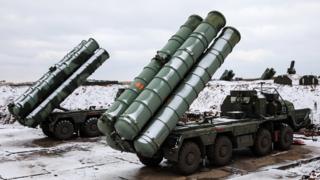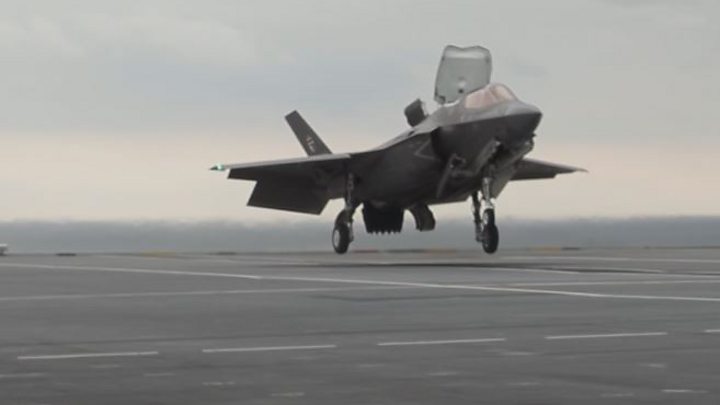What Turkey’s S-400 missile deal with Russia means for Nato
The US and Turkey – one of Washington’s key Nato allies – appear to be on a collision course this summer.
Turkey insists it will go ahead with the purchase of an advanced Russian S-400 air defence system. The first missiles and their associated radars could start to be delivered in July.
The US is urging Ankara to re-consider. It is warning that if the deal goes ahead then Turkey will be cut out of the F-35 warplane programme – the advanced US aircraft that will equip many Nato air forces over the coming decade.
So this is a controversy that has security, strategic and industrial dimensions. It raises questions about Turkey’s reliability as a Nato partner and the diplomatic course that it is pursuing. And given its key geographical location on the alliance’s southern flank – not to mention its role in the Syrian crisis – Turkey is not a country that Nato can turn its back on.
Washington’s concerns about Turkey’s purchase of the S-400 stem from both practical and security considerations.
The S-400 is a generic name for a variety of air defence systems configured in slightly different ways. But whatever version Turkey is buying, the simple fact is that the Russian system cannot be easily incorporated into the wider Nato air-defence system in the region.
This matters because air defences – and we are talking here about defending against both manned aircraft and ballistic missiles – comprise a variety of radars and missiles, each tailored to dealing with particular kinds of threats at particular altitudes.
So the whole is more than just the sum of the parts. Remove one crucial element from the mix by insisting upon a stand-alone system, and the overall defence is weakened.
Russia makes very good air defences. But installing a new system in a Nato member like Turkey is going to require trainers and on-the-ground support which raises all sorts of security concerns. What else might the Russians learn as they help to install and calibrate the weapons?
This is especially worrying for the Americans because Turkey is planning to deploy advanced US-built F-35 warplanes. Indeed, the first couple have already been handed over to Turkey in the US, where Turkish pilots have already been training on them.
The US fears that a Russian presence and involvement in Turkey’s air defences, operating alongside the F-35, could enable Moscow to glean all sorts of useful intelligence.
Turkey insists that the missiles and the bases where the F-35 will operate will be geographically separate. It is also clear that Russia already has the means to gather all sorts of useful data on the F-35. It is already in operational service with the Israeli Air Force and its activities are being closely monitored by Russian radars in Syria.
But the US is far from happy at the Turkish decision. It is not willing, as one US commander put it, “to share the capabilities of the F-35 with Russia”. Efforts to try to integrate the S-400 into Turkish defences could indeed reveal all sorts of details about Nato air defences and the capabilities of its aircraft.
And earlier this month the Trump administration made its response crystal clear. A letter from acting US Defence Secretary Patrick Shanahan to his Turkish counterpart warned that if the deal goes ahead then all Turkish pilots training in the US would have to leave the country by 31 July.
Content is not available
The US has already halted delivery of equipment related to the F-35 programme to Turkey and there will be industrial implications as well.
Turkey is a partner in the programme manufacturing some elements of the aircraft and designated as one of several maintenance sites for its engines. Some 937 separate parts for the F-35 are manufactured in Turkey, about 400 of which are made exclusively there. The US is already taking steps to source these parts elsewhere. Turkey is effectively being frozen out of the F-35 project, although US officials insist that all of this is reversible if Turkey changes its mind.
This is an extraordinary row between two Nato allies and, if Turkey insists upon going ahead with the deal, raises all sorts of questions about Ankara’s standing within the Atlantic alliance.
This will not in itself precipitate Turkey’s departure from Nato. But Turkey is already at loggerheads with the US over Washington’s support for the Kurds in Syria while the increasingly authoritarian style of the Turkish leadership puts it at odds with the liberal values of many other Nato members.
Its tactical flirtation with Russia – obviously another key player in Syria – only adds additional tension to the mix.
How does the S-400 work?
Source: Read Full Article




